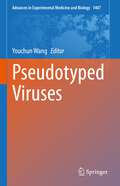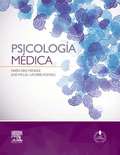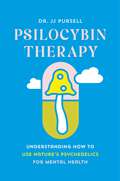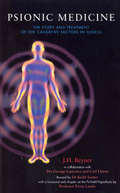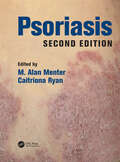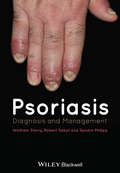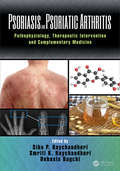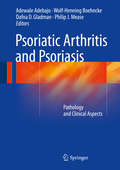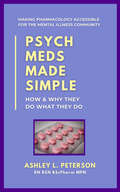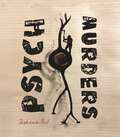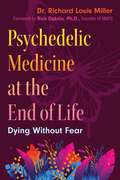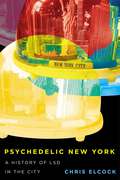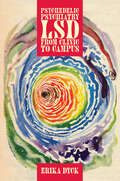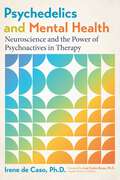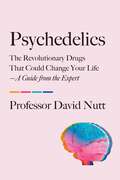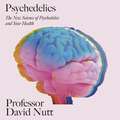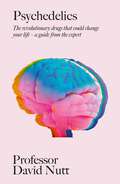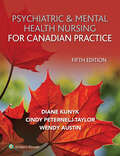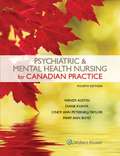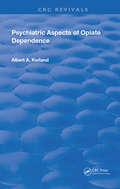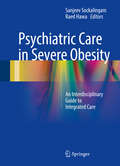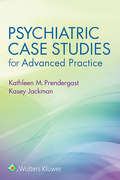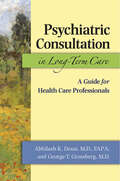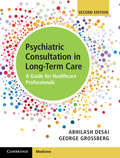- Table View
- List View
Pseudotyped Viruses (Advances in Experimental Medicine and Biology #1407)
by Youchun WangThis book intends to report the new progress of pseudotyped viruses, including the construction of pseudotyped viruses with different strategies or vectors for most important viruses. Especially for emerging viruses, optimization of the condition and parameters for assay development based on the pseudotyped viruses and widely application as surrogate of authentic virus to study the biological functions of virus, detection of neutralizing antibody, screening viral entry inhibiters, and others. It includes most pseudotyped viruses that have the protein of the target virus on the surface of the parent virus with incomplete genome. The book is likely to be of interest to all researchers in the field of virology, vaccine, and anti-viral drug development and evaluation.
Psicología médica + StudentConsult en español (Spanish Edition)
by Darío Díaz Méndez José Miguel Latorre PostigoLa psicología médica es un campo del saber relativamente reciente y en creciente desarrollo, que se halla situado en las zonas de entrecruzamiento de la psicología con la medicina, por tanto en un terreno estrictamente interdisciplinar. <P><P>Los editores de esta obra pretenden con esta propuesta responder a una demanda existente, contando para su desarrollo con los profesores responsables de la materia de diferentes facultades españolas y de Latinoamérica. <P><P>El objetivo es comprender los aspectos psicológicos y sociales que influyen en los procesos de salud y enfermedad, prestando atención al análisis de la interacción médico-paciente, la promoción de conductas saludables, el aprendizaje de las técnicas de intervención psicológica y la adquisición de conocimientos, habilidades y actitudes relacionados con la planificación, coordinación y liderazgo de equipos de trabajo en el ámbito de las ciencias de la salud. <P><P>Psicología médica es un texto riguroso en el que se recogen de manera sistemática los últimos avances científicos en el estudio del comportamiento humano relacionado con la salud. Se trata del único texto actualizado disponible en español en un campo científico en continua evolución, adaptado al Espacio Europeo de Educación Superior y dirigido a estudiantes de medicina y otras ciencias de la salud, especialmente enfermería y odontología. <P><P>La obra se divide en cinco grandes bloques temáticos en los que se abordan desde los procesos psicológicos básicos, la personalidad y el desarrollo en un entorno social, la comunicación asistencial y la interacción médico-enfermo, hasta contenidos introductorios a la psicopatología y la psicoterapia. <P><P>En su elaboración, de carácter multidisciplinar, han participado 53 profesores e investigadores nacionales e internacionales de los ámbitos de la medicina, la psicología, la enfermería o la biología, todos ellos expertos en sus campos de conocimiento. A pesar de su rigor, se ha empleado un lenguaje didáctico.
Psicología médico-forense: La investigación del delito (Segunda Edición)
by Javier Burón OrejasJuzgar un delito es la fase final de un proceso que implica investigar y buscar pruebas. Administrar bien la justicia significa, pues, realizar correctamente la investigación del delito: definir si la acción es delictiva, determinar si su autor es responsable, buscar pruebas y hacer un análisis imparcial de las mismas. Las pruebas pueden ser relativamente objetivas y tener, por lo tanto, un menor margen de error: entre ellas podemos incluir las aportadas por la Medicina Forense, la Policía Científica y expertos científicos como arquitectos, ingenieros, físicos, etc. Sin embargo, no siempre existen estas pruebas objetivas, o son insuficientes, y hay que juzgar basándose en los testimonios de testigos que se fundamentan en la fragilidad de la percepción y memoria del ser humano, o en su propia conveniencia. Para analizar todo este proceso de la investigación del delito y contribuir a una mejor administración de la justicia y a un mejor entendimiento de la complejidad de la investigación de la acción delictiva, se reúnen en este libro las aportaciones de expertos en Derecho Penal, Medicina Forense, Policía Científica y Psicología Jurídica, dando como resultado una visión multidisciplinar fundamental, imprescindible y poco común en nuestro entorno.
Psilocybin Therapy: Understanding How to Use Nature's Psychedelics for Mental Health
by Dr. JJ PursellDiscover a new path to self-discovery and healing with this timely exploration of the therapeutic benefits of psilocybin mushrooms. In Psilocybin Therapy, Dr. JJ Pursell explores the next frontier in mental health: the therapeutic use of psilocybin mushrooms and related psychedelics. Readers will learn about the chemical makeup of mushrooms and what makes them powerful, the history of the fungi, the thought leaders in the movement, and the impact of psilocybin on the brain. Additional chapters explore how to use psilocybin with a facilitator, how psychedelics can help users work through deep psychological issues, what microdosing means, and how to assess potential risks. Pursell weaves her personal experience with psilocybin as both a user and a facilitator throughout the text. The result is a relatable, accessible, and helpful guide for those seeking a new form of self-discovery and healing.
Psionic Medicine: The Study and Treatment of the Causative Factors in Illness
by J H ReynerPsionic Medicine heralds the dawn of a new era in medical practice, with health-maintaining and curative potentials that are a significant addition to the repertory of treatment developed in biochemical medicine.In Psionic Medicine the critical factor is not chemistry and surgical intervention - though such methods remain indicated in some cases - but subtle 'informational' inputs that affect the patient's biofield.The book in the hands of the reader provides a remarkably clear and concise overview of what psionic medicine is, how it works, and why it deserves the kind of attention that presently only molecular and genetics-based breakthroughs are accorded. It merits serious and urgent attention by the general lay public and the medical professionals alike.
Psoriasis
by M. Alan Menter Caitriona RyanThe new edition of a concise yet thorough illustrated review of the diagnosis and treatment of many forms of psoriasis now includes the many new therapies available and in development, as well as more material on psoriasis as a systemic disease and on comorbidities. This will be of interest to all dermatologists in training and practice, as well as primary care physicians.
Psoriasis
by Robert Sabat Wolfram Sterry Sandra PhilippPractical and user-friendly, this is the ideal guide to the diagnosis and treatment of psoriasis, helping you navigate a logical management pathway through a complex maze of possibilities.Psoriasis is a cruel disease that can seriously affect the sufferer's quality and length of life. It is also highly idiosyncratic, with features that vary greatly from patient to patient; this being mirrored in the highly variable response to treatment. It is increasingly recognized that psoriasis is not a discrete disease and that many patients suffer two or three comorbid conditions that can complicate the efforts of doctors treating patients.Psoriasis: Diagnosis and Management will provide dermatologists of all levels with a practical, well-illustrated approach to fully understanding the disease, including clear, clinical guidance to enable best-practice and effective management of patients.In full color throughout and excellently illustrated, key highlights include:easily understandable description of the psoriasis pathogenesis;a strong emphasis on the clinical features of psoriasis;careful consideration of comorbid conditions as part of the psoriatic spectrum to be managed;coverage of both traditional and contemporary management approaches;plenty of diagnostic algorithms and management protocols to aid the daily practical care of patients.Brought to you by several of the world's leading authorities on the subject, Psoriasis: Diagnosis and Management is an essentialpurchase for the dermatologist.
Psoriasis and Psoriatic Arthritis: Pathophysiology, Therapeutic Intervention, and Complementary Medicine
by Debasis Bagchi Siba P. Raychaudhuri Smriti RaychaudhuriPsoriasis is a life-long chronic autoimmune disease characterized by thick scaly skin lesions and often associated with severe arthritis. In psoriasis, lesions skin cells, keratinocytes, grow too quickly, resulting in thick, white, silvery or red patches on skin. Normal skin cells grow gradually and flake off about every four weeks, but psoriasis causes new skin cells to move rapidly to the surface of the skin in days rather than weeks. Psoriasis symptoms often appear on the elbows, scalp, feet, knees, hands, or lower back, or as flaking or patches on the skin. It is most common in adults, but teenagers and children can also suffer from psoriasis. Psoriasis is not only a skin condition; it is a chronic disease of the immune system. Chronic psoriasis is associated with other health conditions such as psoriatic arthritis, several inflammatory disorders, type 2 diabetes, and cardiovascular disease. This book provides extensive coverage of psoriasis and psoriatic arthritis. It features information on epidemiology and etiology of psoriasis, pathogenesis, genetics of psoriasis, clinical manifestations, and treatment options using cutting-edge drugs including adalimumab and tofacitinib. Natural phytochemicals and nutraceuticals have demonstrated efficacy in ameliorating psoriasis. The book dedicates comprehensive coverage of nutraceutical therapeutic options including antioxidants, bioactive peptides, carotenoids, alpha lipoic acid, curcumin, and whey protein. These inexpensive natural therapeutics are not associated with any known adverse side effects.
Psoriatic Arthritis and Psoriasis
by Adewale Adebajo Wolf-Henning Boehncke Dafna D. Gladman Philip J. MeaseEducational advancement in the field of psoriatic arthritis which this book will provide is consistent with GRAPPA's aims and objectives leading to a productive synergy. GRAPPA (Group for Research and Assessment of Psoriasis and Psoriatic Arthritis), is recognized world wide as the leading international society for the study and promotion of awareness of psoriatic arthritis. GRAPPA is an association of leading rheumatologists, dermatologists, representatives of patient service leagues and other stakeholders focused on psoriasis and PsA. Psoriatic Arthritis (PsA) ranks with rheumatoid arthritis and axial spondyloarthritis as one of the most prevalent inflammatory arthropathies worldwide. There is now a significant global awareness among Rheumatologists, Dermatologists, Internal Medicine Specialists, Gastroenterologists, General Practitioners, Family Practitioners, Physiotherapists, Nurse Specialists, Immunogeneticists and many other Health Care Professionals with regards to the importance of psoriatic arthritis.
Psych Meds Made Simple: How and Why They Do What They do
by Ashley L. PetersonPeople living with mental illness are often left out of the loop when it comes to understanding how exactly medications work. This book will explain pharmacology in a simplified way to help you understand the effects, both positive and negative, of psych meds, and why these effects occur. It's everything you didn't realize you wanted to know about medications! The book begins with the essentials of pharmacology and moves on to cover all the major classes of psychiatric medications. You'll learn why one medication in a particular class might be a better fit for you than another. Are you having weight gain from your medication? You'll find out why, and what other medications might be less likely to have the same side effect. I've pulled together what I've learned in my training as a nurse and (former) pharmacist and years of clinical experience, added in my personal perspective from having taken many of these medications, and distilled it down to the essential elements you need to know to take charge of your own health and illness.
Psych Murders (Made in Michigan Writers Series)
by Stephanie HeitStephanie Heit’s hybrid memoir poem blasts the page electric and documents her experience of shock treatment. Using a powerful mélange of experimental forms, she traces her queer mad bodymind through breathlessness, damage, refusal, and memory loss as it shifts in and out of locked psychiatric wards and extreme bipolar states. Heit survives to give readers access to this somatic, visceral rendering of a bipolar life complete with sardonic humor, while showing us the dire need for new paradigms of mental health care outside closets, attics, prisons, and wards. Psych Murders adds a vital layer of lived experience of electroshocks and suicidal ideation to the growing body of literature of madness and mental health difference.
Psychedelic Medicine at the End of Life: Dying without Fear
by Dr. Richard Louis Miller• Outlines 10 steps for dying gracefully with the help of psychedelics, including how to navigate the complex legal landscape and find the right guide and therapy• Looks at clinical studies of psychedelics from UCLA, Johns Hopkins, and NYU School of Medicine that show dramatic lessening of end-of-life anxiety in terminally ill patients• Shares wisdom from experts on psychedelic research and palliative care, including Roland Griffiths, Katherine MacLean, Ira Byock, and Anthony BossisExamining the evolving landscape that is found around end-of-life psychedelic care, Dr. Richard Louis Miller, a clinical psychologist for more than half a century, looks at how LSD, MDMA, psilocybin, and ayahuasca can be vital tools in allowing individuals in all stages of life to confront fears of dying and, in so doing, lead richer lives.Miller shares wisdom from experts on the frontiers of psychedelic research and palliative care—including Roland Griffiths, Katherine MacLean, Ira Byock, and Anthony Bossis—and examines cutting-edge studies from Johns Hopkins, UCLA, and NYU School of Medicine that show dramatically decreased anxiety in terminally ill patients through the use of psychedelics. He explores how different substances can help the dying overcome their end-of-life distress. He also provides testimony from researchers and patients participating in psychedelic-assisted psychotherapy that helps convey the experience of ego death at the heart of the psychedelic experience.Miller outlines 10 steps for dying gracefully, without fear, with the help of psychedelics. He examines how to navigate the complex legal landscape and find the right guide, dose, and therapy. He also includes reflections from key figures in the psychedelic community as well as some of his own psychedelically informed mystical and near-death experiences.Revealing psychedelics as a portal of transformation, Miller shows how they are singularly valuable in helping individuals face the end of life with courage and serenity.
Psychedelic New York: A History of LSD in the City (Intoxicating Histories)
by Chris ElcockAs LSD moves towards the medical mainstream, it continues to evoke powerful memories of the psychedelic sixties and west coast counterculture. In this lively account, Chris Elcock follows a different branch of psychedelic history – one that is sprawling, layered, and centred on New York City. A major hub for the production and consumption of LSD and other hallucinogenic drugs, New York spawned a unique psychedelic culture that reverberated through the city, from psychoanalytic circles to artists’ studios, Greenwich Village to Central Park. Based on years of archival research, interviews with former acid heads, and a range of cultural artifacts, Psychedelic New York shows how the postwar city was at the forefront of LSD medical research, the burgeoning of psychedelic art, drug-accompanied spiritual seeking, and a proliferation of drug subcultures. Elcock recounts stories of New Yorkers such as Holocaust survivor Nina Graboi and artist Isaac Abrams, whose lives were dramatically altered by their psychedelic experiences, while offering new insights into Timothy Leary’s role in turning on the city with psilocybin.Enlivened by personal stories and rooted in thoughtful analysis, Psychedelic New York is a multifaceted history of LSD and the urban psychedelic experience.
Psychedelic Psychiatry: LSD from Clinic to Campus
by Erika DyckLSD's short but colorful history in North America carries with it the distinct cachet of counterculture and government experimentation. The truth about this mind-altering chemical cocktail is far more complex—and less controversial—than generally believed. Psychedelic Psychiatry is the tale of medical researchers working to understand LSD’s therapeutic properties just as escalating anxieties about drug abuse in modern society laid the groundwork for the end of experimentation at the edge of psychopharmacology. Historian Erika Dyck deftly recasts our understanding of LSD to show it as an experimental substance, a medical treatment, and a tool for exploring psychotic perspectives—as well as a recreational drug. She recounts the inside story of the early days of LSD research in small-town, prairie Canada, when Humphry Osmond and Abram Hoffer claimed incredible advances in treating alcoholism, understanding schizophrenia and other psychoses, and achieving empathy with their patients. In relating the drug’s short, strange trip, Dyck explains how concerns about countercultural trends led to the criminalization of LSD and other so-called psychedelic drugs—concordantly opening the way for an explosion in legal prescription pharmaceuticals—and points to the recent re-emergence of sanctioned psychotropic research among psychiatric practitioners. This challenge to the prevailing wisdom behind drug regulation and addiction therapy provides a historical corrective to our perception of LSD’s medical efficacy.
Psychedelics and Mental Health: Neuroscience and the Power of Psychoactives in Therapy
by Irene de Caso• Details how psychedelics alter our experience from a neurological perspective, including what neurons they interact with, their effects on cognitive and emotional processing, and why those effects can be therapeutic• Looks at clinical results with LSD, psilocybin from magic mushrooms, and DMT from ayahuasca, as well as empathogens such as MDMA, found in ecstasy• Provides an illustrated introduction to neuroscience and a vision for a new model of psychotherapy where psychedelics help bring lasting healingPresenting a comprehensive guide to the new and evolving landscape of psychedelic-assisted mental health treatment, neuroscientist Irene de Caso takes you on a journey through the brain, revealing how psychedelics and empathogens, if taken in a safe and therapeutic environment, can lead to positive and lasting changes.Providing an illustrated introduction to neuroscience and molecular actions in the body and brain, the author details how psychedelics alter our experience, including their effects on cognitive and emotional processing and how those effects can be therapeutic. She explores the wide body of evidence behind the psychedelic revolution in psychiatry and psychotherapy and looks at clinical studies on hallucinogens such as LSD, psilocybin from magic mushrooms, and DMT from ayahuasca as well as empathogens such as MDMA found in ecstasy. She reviews the efficacy of psychedelics in treating alcoholism and other addictions, post-traumatic stress disorder, social anxiety in autistic individuals, treatment-resistant depression, and other conditions, offering statistical comparisons to conventional antidepressants and mood-enhancing drugs. She also explores the psychedelic experience through neuroimaging and phenomenological experience, considering mystical states, synesthesia, and the therapeutic benefits of momentary ego-dissolution.Laying the foundation for a new model of psychotherapy, de Caso shows how psychedelics can help break down our defense mechanisms, offer direct access to the subconscious, and provide a path to deeper, lasting healing.
Psychedelics: The Revolutionary Drugs That Could Change Your Life—A Guide from the Expert
by Professor David NuttThe definitive guide to the science of psychedelics—"the perfect intro for anyone curious about psychedelics and MDMA&” (Ethan Nadelmann, founder and former executive director, Drug Policy Alliance)--and how they can impact our health by world-renowned, leading authority Professor David Nutt. We are on the cusp of a major revolution in psychiatric medicine and neuroscience. After fifty years of prohibition, criminalization and fear, science is finally showing us that psychedelics are not dangerous or harmful. Instead, when used according to tested, safe and ethical guidelines, they are our most powerful newest treatment of mental health conditions, from depression, PTSD, and OCD to disordered eating and even addiction and chronic pain. Professor David Nutt, one of the world's leading Neuropsychopharmacologists, has spent 15 years researching this field and it is his most significant body of work to date. In 2018, he co-founded the first academic psychedelic research center - underpinned by his mission to provide evidence-based information for people everywhere. It revived interest in the understanding and use of this drug in its many forms, including MDMA, ayahuasca, magic mushrooms, LSD and ketamine. The results of this have been nothing short of ground-breaking for the future categorization of drugs, but also for what we now know about brain mechanisms and our consciousness. At a time where there is an enormous amount of noise around the benefits of psychedelics, this book contains the knowledge you need to know about a drug that is about to go mainstream, free from the hot air, direct from the expert. Are you ready to change your mind?
Psychedelics: The revolutionary drugs that could change your life – a guide from the expert
by Professor David NuttThe definitive guide to psychedelics, science and our health by a world-renowned, leading authority, Professor David Nutt.We are on the cusp of a major revolution in psychiatric medicine and neuroscience. After fifty years of prohibition, criminalisation and fear, science is finally showing us that psychedelics are not dangerous or harmful. Instead, when used according to tested, safe and ethical guidelines, they are our most powerful newest treatment of mental health conditions, from depression, PTSD, and OCD to disordered eating and even addiction and chronic pain.Professor David Nutt, one of the world's leading Neuropsychopharmacologists, has spent 15 years researching this field and it is his most significant body of work to date. In 2018, he co-founded the first academic psychedelic research centre - underpinned by his mission to provide evidence-based information for people everywhere. It revived interest in the understanding and use of this drug in its many forms, including MDMA, ayahuasca, magic mushrooms, LSD and ketamine. The results of this have been nothing short of ground-breaking for the future categorisation of drugs, but also for what we now know about brain mechanisms and our consciousness.At a time where there is an enormous amount of noise around the benefits of psychedelics, this book contains the knowledge you need to know about a drug that is about to go mainstream, free from the hot air, direct from the expert.Are you ready to change your mind?(P) 2023 Hodder & Stoughton Limited
Psychedelics: The revolutionary drugs that could change your life – a guide from the expert
by Professor David NuttWe are on the cusp of a major revolution in psychiatric medicine and neuroscience. After fifty years of prohibition, criminalisation and fear, science is finally showing us that psychedelics are not dangerous or harmful. Instead, when used according to tested, safe and ethical guidelines, they are our most powerful newest treatment of mental health conditions, from depression, PTSD, and OCD to disordered eating and even addiction and chronic pain.Professor David Nutt, one of the world's leading Neuropsychopharmacologists, has spent 15 years researching this field and it is his most significant body of work to date. In 2018, he co-founded the first academic psychedelic research centre - underpinned by his mission to provide evidence-based information for people everywhere. It revived interest in the understanding and use of this drug in its many forms, including MDMA, ayahuasca, magic mushrooms, LSD and ketamine. The results of this have been nothing short of ground-breaking for the future categorisation of drugs, but also for what we now know about brain mechanisms and our consciousness.At a time where there is an enormous amount of noise around the benefits of psychedelics, this book contains the knowledge you need to know about a drug that is about to go mainstream, free from the hot air, direct from the expert.Are you ready to change your mind?
Psychiatric & Mental Health Nursing for Canadian Practice
by Mary Ann Boyd Wendy Austin Cindy Ann Peternelj-Taylor Diane KunykThoroughly written, extensively updated, and optimized for today’s evolving Canadian healthcare environment, Psychiatric & Mental Health Nursing for Canadian Practice, 5th Edition, equips students with the fundamental knowledge and skills to effectively care for diverse populations in mental health nursing practice. This proven, approachable text instills a generalist-level mastery of mental health promotion, assessment, and interventions in adults, families, children, adolescents, and older adults, delivering Canadian students the preparation they need to excel on the NCLEX® exam and make a confident transition to clinical practice.
Psychiatric & Mental Health Nursing for Canadian Practice (M - Medicine Ser.)
by Mary Ann Boyd Wendy Austin Cindy Ann Peternelj-Taylor Diane KunykMeet the challenges of mental health nursing—in Canada and around the world. Optimized for the unique challenges of Canadian health care and thoroughly revised to reflect the changing field of mental health, Psychiatric & Mental Health Nursing for Canadian Practice, 4th Edition, is your key to a generalist-level mastery of fundamental knowledge and skills in mental health nursing. Gain the knowledge you need to deliver quality psychiatric and mental health nursing care to a diverse population. • Discover the biological foundations of psychiatric disorders and master mental health promotion, assessment, and interventions for patients at every age. • Explore current research and key topics as you prepare for the unique realities of Canadian clinical practice. • Gain a deeper understanding of the historical trauma of Aboriginal peoples and its implications for nursing care. • Online Video Series, Lippincott Theory to Practice Video Series: Psychiatric-Mental Health Nursing includes videos of true-to-life patients displaying mental health disorders, allowing students to gain experience and a deeper understanding of mental health patients.
Psychiatric Aspects of Opiate Dependence (Routledge Revivals)
by Albert A. KurlandFirst published in 1978: This book discusses the Psychiatric effects of Opiate dependence.
Psychiatric Care in Severe Obesity
by Sanjeev Sockalingam Raed HawaThis book is designed to present a comprehensive, state-of the-art approach to assessing and managing bariatric surgery and psychosocial care. Unlike any other text, this book focuses on developing a biopsychosocial understanding of patients' obesity journey and psychosocial factors contributing to their obesity and its management from an integrated perspective. Psychiatric Care in Severe Obesity takes a 360 approach by covering the disease's prevalence and relationship to psychiatric illness and social factors, including genetics, neurohormonal pathways and development factors for obesity. This book presents evidence and strategies for assessing psychiatric issues in severe obesity and uses common psychiatric presentations to feature the impact on bariatric surgery and key assessment features for weight loss. Concluding chapters focus on evidence-based psychosocial treatments for supporting patients with weight loss and bariatric surgery and includes educational tools and checklists for assessment, treatment, and care. Experts on non-pharmacological interventions such as mindfulness, cognitive-behavioral therapy and nutrition education describe treatment approaches in each modality, concluding with pharmacological approaches for psychiatric conditions and eating pathology. Additional tools in the appendices support clinicians, making this the ultimate guide for managing psychiatric illness in patients suffering from severe obesity. As obesity continues to grow in prevalence as a medically recognized epidemic, Psychiatric Care in Severe Obesity serves a vital resource to medical students, psychiatrists, psychologists, bariatric surgeons, primary care physicians, dietitians, mental health nurses, social workers, and all medical professionals working with severely obese patients.
Psychiatric Case Studies for Advanced Practice
by Kathleen PrendergastGet much-needed exposure to real-world clinical scenarios and psychiatric evaluations, with this invaluable guide to positive, effective psychiatric advance practice nursing care. For an expert guide to providing patient-centered, evidence-based psychiatric care, keep Psychiatric Case Studies for Advanced Practice by your side. Practical and easy-to-follow, these more than 50 case scenarios clearly display the complaints, diagnoses, and treatments of the most common psychiatric disorders, supporting the critical decision-making skills of nurses practicing in a broad range of settings. Psychiatric, family, emergency, and general practice nurse practitioners of all experience levels will find this an invaluable aid for creating an informed, holistic practice. Follow the real-life cases and expert analysis of psychiatric patients of a wide variety of ages, backgrounds, and conditions . . . Real-world child, adolescent, adult, and geriatric inpatient and outpatient psychiatric case studies that emphasize problem-based learning and an evidence-based practice Current diagnostic content from the Diagnostic and Statistical Manual of Mental Disorders, 5th Edition (DSM-5), that includes DSM-5’s newer diagnoses—gender dysphoria, binge eating disorder, and autism spectrum, plus current treatments for alcohol and opiate addiction Sample routine screening tools that offer convenient checklists and handouts to support patient treatment Content presented in a simple format—organized by age and indexed by diagnostic category for quick reference Each case presented in a standard format: chief complaint, history, mental status, diagnosis, differential diagnosis, treatment plan, and rationale for treatment prescribed—with questions at the end that guide you to create a diagnosis using the DSM-5 Cases addressing a wide range of disorders and supporting all experience levels in a variety of treatment settings—counseling centers, correctional facilities, homeless shelters, inpatient psychiatric units, and hospital consultation and liaison services Treatments and rationales that represent current, evidence-based research—treatment sections divided into psychopharmacology, diagnostic tests, referral, psychotherapy, and psychoeducatio Supplemental teaching tool for graduate psychiatric nurse practitioner/APN programs
Psychiatric Consultation in Long-Term Care: A Guide for Health Care Professionals
by George T. Grossberg Abhilash K. DesaiStudies show that residents of nursing homes and assisted living facilities are at a substantial risk of having psychiatric disorders. This practical volume provides much-needed clinical guidance for the prevention and appropriate treatment of mental illness in long-term care settings.Abhilash K. Desai and George T. Grossberg offer a basic framework for a humanistic, team-based approach to meeting the needs of elder persons with mental disorders in long-term care facilities. Early chapters cover the demographics of residents, the epidemiology of their psychiatric symptoms, and the assessment process. Subsequent chapters focus on major disorders, including dementia, delirium, depression, psychosis, and anxiety. The authors discuss end-of-life issues and treatments and offer suggestions for improving care. Throughout, they highlight the importance of the relationship between staff and residents.Emphasizing creative engagement and hands-on care and featuring clinical vignettes and practical tips, this optimistic volume reinforces the potential for nursing homes and assisted living facilities to be communities where residents thrive.
Psychiatric Consultation in Long-Term Care: A Guide for Healthcare Professionals
by Desai Abhilash K. Grossberg George T.Building on the first edition, Psychiatric Consultation in Long-Term Care has been fully revised and updated, integrating DSM-5 classification throughout. It delivers an essential resource for psychiatrists, neurologists, geriatricians, palliative care physicians, primary care physicians, nurse practitioners, pharmacists, and physician assistants involved in prevention, assessment, diagnosis, and management of neuropsychiatric disorders in long-term care (LTC) populations, as well as for nurses, social workers, and other professionals involved in important day-to-day care. The book provides comprehensive descriptions of practical, strengths-based, individualized, psychosocial, spiritual, and environmental approaches, and high-quality mental healthcare utilizing pharmacological interventions when appropriate to improve the emotional and spiritual well-being of LTC residents. It details key elements in creating genuine person-centered long-term care: the reduction of inappropriate medications and counter-therapeutic staff approaches, treating serious psychiatric disorders with evidence-based interventions, and a road-map for owners and administrators of LTC facilities.
